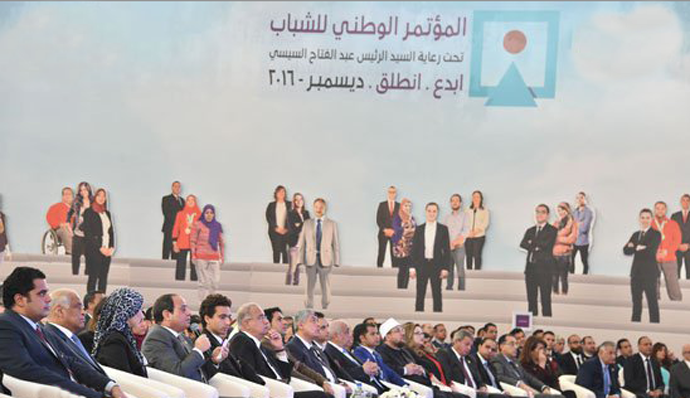President Abdel Fattah El-Sisi inaugurated last Saturday the first regular youth conference, which was attended by hundreds of youths from different governorates, universities, and political parties, according to a presidential statement. Several ministers, government officials, political and religious leaders, and members of parliament also attended the conference.
The president also spoke about education in Egypt. He praised the role of the youth in finding solutions to the challenges facing the education sector. El-Sisi further added that education shouldn’t be limited to knowledge and science, but should also include morality. He said that Egypt should benefit from the experiences of other countries.
The conference was held based on the recommendation of the National Youth Conference that was held in Sharm El-Sheikh in October. The most prominent outcome of October’s conference was the presidential Detained Youth Committee. The committee prepared a list of about 82 detainees who were released by a presidential pardon in November. According to members in the committee, a second list has been prepared and presented to El-Sisi.
The second list includes about 300 to 400 detainees. During the conference, an international initiative was launched to support the Egyptian nominee ambassador Moushira Khattab to be the next director of the United Nations Educational, Scientific and Cultural Organisation (UNESCO). On his official Twitter account, El-Sisi supported Khattab and called on Egyptians to support her as well.
The Conference was attended by the economic Ministers and think tanks in a panel reflecting the Government›s economic vision and challenges. The Central Bank›s governor, Tarek Amer (after concluding his first full year in office) explained the stand of Egypt›s Foreign currency reserves by indicating that Egypt received $10bn from Arab countries over 2015, of which non was received in 2016, On the other hand, Tourism earnings dropped from $7bn in 2015 to $3bn in 2016. Amer explained, that developing gap between our current foreign funds required an immediate action to remedy the economy’s core.
Amer added that we have to work on developing solutions for foreign currency inflow through investments, stating that the pound devaluation has yielded $5bn from the internal market and $1bn from International Investment Funds within the first month of devaluation. Minister of Investment, Dalia Khorshid, said that although the main challenges remain in solving investors disputes, legislations and bureaucracy, she confirmed that the Ministry has solved about 400 Investor disputes exceeding $90bn dollars since April, while on the other hand, the investment law (which is expected to be forwarded to the Parliament within this month for approval) is the corner stone for motivating investments, there will be a series of other laws adjustments like the Bankruptcy, disputes settlement as well as SMEs and companies laws.
Khorshid added that the Government will stand behind building the Egyptian industry and increasing exports, that are currently cheaper and accordingly more competitive in international markets, as the government has packaged incentives for investors who are willing to work on the strategic projects suggested by the Ministry of trade and industry, specially in certain geographical areas.
Prime minister of Egypt, Dr. Sherif Ismail said that out of Egypt› current budget, after excluding department interests, subsidies and Salaries, the Government has only $15bn to meet its various challenges and developments. Dr. Hala Helmy El-Said Dean of the Faculty of Economics and Political Science (FEPS) at Cairo University, Assistant to Cairo University President for Research and External Relations and a member of the board of the Central Bank of Egypt, stated that Education, Health and housing remain the immediate challenges facing Egypt.
On the other hand, El-Said stated that Egypt faces various challenges within the coming phase; the first challenge is the growing imbalance between production and population and the need to utilise education and training for developing the young population into active production. The second challenge is increasing exports in 2 years from 18 to 30 billion dollars. The third challenge is developing the core of Egypt’s economy through investing in production projects in the sectors of industry and Agriculture, rather than services that we have concentrated on for years. The forth challenge is developing the monitoring agencies and authorities for standards and quality of Egyptian products. The fifth challenge, equality between Egyptian and foreign investors (as per the new investment law). The sixth challenge is the need to lure the under-economy through incentives of medical and social welfare rather than the negative tax collection approach. Finally she stated that marketing the economic vision is important to get people involved in the process in a transparent manner to advocate the government.
President El-Sisi stated that he lived Egypt over the past 30-40 years, and it is time to cure the chronic economy, through implementing the actual economic reform needed. He stated the need to consolidate our efforts towards understanding our economic challenges and asked citizens to be accountable for a better tomorrow for their children. He finally stressed on the importance of Egyptians Solidarity as a United Nation.


